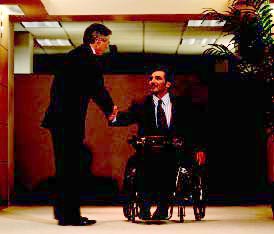Health and Wellness: Breaking Up Is Hard To Do: When Your Job Gets the Better of You
Written by Shelley Peterman Schwarz
Edited by Susan Wells Courtney

You love your job. In addition to much needed income, it gives you a sense of pride and accomplishment, perhaps even a level of status in the community. Our work is an integral part of who we are.
In our culture, we are defined by what we do. If you don’t believe that, just think, when you meet people for the first time, what’s the first question they ask? Isn’t it, “So tell me, what do you do?” When what we do is so much a part of who we are, how do we know when it is time to give up that part of us, and when we do, how do we deal with the psychological, emotional, and social toll surrounding such a major life change?
With a chronic illness like MS, the time may come when the effort it takes to continue working becomes so draining that your health and family life begin to suffer. At first, you may cope by giving up time with friends, and recreational activities are put aside so you can rest up to continue working. At the job, you take short cuts, cut back on extra duties, and find creative ways to have others do the things that are hard for you. But no matter how hard you try, you may not be able to keep up the pace, and you have to face the fact that something has to give. When the symptoms of MS affect your ability to continue working, this may trigger feelings of anger, frustration, and perhaps even embarrassment.
Should you need to leave your job because of the symptoms of MS, I hope that my experience can help to bridge the gap between how things were and how things are now. I also hope that my experience may inspire you to find a new sense of purpose and accomplishment in your life.
Shelley’s Story
Perhaps like me, you knew at an early age what you wanted to be when you grew up. I was just 15, when helping several hearing-impaired girls in gym class sparked my desire to become a teacher of the Deaf. I loved my career as a teacher of the Deaf. It was such a part of me that I continued teaching after my children were born; even returning to work from maternity leave early because I was so passionate about my work, and I missed the students terribly.
Being so passionate about my career, imagine my dismay when I began to have trouble finger spelling and signing! It was not long after that I was diagnosed with multiple sclerosis (MS).
For two years after my diagnosis, I continued working, determined not to let this “MS thing” change my life. Fortunately, I was working part time and was no longer teaching in the classroom; I had citywide responsibilities working with teachers, and I could arrange (or rearrange) my schedule and pace myself so I would have the energy I needed to do my job.
I made minor modifications. For example, I’d spend part of the day in my quiet office and part of it in the schools. I started dictating reports instead of typing or writing them. (This was years before personal computers and voice-recognition software.) I cut back on my committee participation. When I needed to get involved, I chose jobs that were more sedentary and time limited. I tried very hard to pass as “normal,” not letting the effects of my illness become apparent. I went so far as to stretch the truth — one day, when I felt particularly shaky on my feet, I wore an “ACE” bandage around one ankle to give it support, and when a colleague asked me about it, I said that an old sports injury was acting up.
How Symptoms Can Affect Work
MS can affect all aspects of your workday, from getting to and from the office, to communicating with fellow employees. Energy levels ebb and wane, while cognitive abilities may be affected, making it difficult to find the right word or remember important facts. At some point you may be faced with a crisis situation where suddenly your whole body refuses to cooperate. What do you do?
To Tell or Not to Tell
 You may be hesitant to tell your employer about your disability, for fear that you might lose your job. This can be an issue, however, the Americans with Disabilities Act i (ADA) is designed to offer protection for workers with disabilities; you cannot lose your job simply because of a disability. [To ask questions or receive free printed information on the ADA, readers may call the toll-free information line at (800) 514-0301 (TTY 800-514-0383).] The key to a successful transition is knowing when to speak up and how to do so in a way that inspires cooperation and offers solutions.
You may be hesitant to tell your employer about your disability, for fear that you might lose your job. This can be an issue, however, the Americans with Disabilities Act i (ADA) is designed to offer protection for workers with disabilities; you cannot lose your job simply because of a disability. [To ask questions or receive free printed information on the ADA, readers may call the toll-free information line at (800) 514-0301 (TTY 800-514-0383).] The key to a successful transition is knowing when to speak up and how to do so in a way that inspires cooperation and offers solutions.
Timing is a key consideration. One option is to approach your employer before the symptoms of MS affect your job performance. Be prepared to briefly explain your illness, how it might affect your job performance, and suggest inexpensive adjustments (accommodations) that will help you to continue to be a productive and valuable employee. Most employers are willing to accommodate your needs if they value the work that you do.
Making Accommodations
Inexpensive accommodations might be as simple as providing an adjustable keyboard tray, relocating your workspace closer to the door, or providing a chair or stool on wheels. If you require a wheelchair, raising your desktop or exchanging your vertical file cabinet for a lateral file are changes that can be easily made.
Perhaps you need to adjust your duties – exchanging job functions that are difficult for you to perform (such as lifting, reaching into a high file cabinet, or collating papers) with a coworker, while taking over other areas of their job that don’t require as much mobility or dexterity. Another option is to take advantage of adaptive computer programs to make your job easier, like Dragon NaturallySpeaking® voice-recognition software ii to eliminate keyboarding. You might need to ask for more time to accomplish tasks, to spend part of your workweek telecommuting, or to be retrained to do a less strenuous job. It is the responsibility of each of us to ask for what we need in order to accomplish our job duties in a way that is positive and solution oriented.
Resources to Help You and Your Employer
Each state and United States territory has a vocational rehabilitation (VR) program that can help you assess your work skills, determine your needs, and suggest simple accommodations to help you continue working. They can also help you and your employer to communicate and problem solve in the workplace to accommodate your disability. Other VR programs assist with physical accommodations to your workplace or retraining for other work, even paying for all or part of the accommodation. For a list of VR programs in your area, readers may visit the Social Security Administration iii website at www.ssa.gov/work or call (800) 772-1213 (TTY 800-325-0778) Monday through Friday, 7:00 am to 7:00 pm.
I was honest with my boss, school principals, teachers, students, and parents, right from the beginning about my diagnosis and how MS might affect my job performance. I was lucky that my honesty was met with understanding and a willingness to work with me as I tried to continue to be a valued employee. I had to learn to be my own advocate and ask for the accommodations I needed. For example, since my dominant right hand was giving me the most trouble, I asked people to share their meeting notes with me so that I wouldn’t have to take notes at meetings. My colleagues offered their help as well. To save me steps and energy, they’d bring me a cup of coffee from the break room, get my lunch out of the refrigerator, or run something down to the mail room for me.
I parked as close to the door as I could to avoid walking in the parking lots, and eventually obtained a disabled parking hang tag for my car so that I could park in the handicapped parking spaces. If the school had an elevator, I used it. To recharge at lunchtime, I’d lie down in the nurse’s office for a half-hour. I started wearing loafers instead of heels because I felt my balance was off and I had fallen a couple of times; wearing loafers to work was a very emotional decision for me especially because people in my position were dressed in suits and business-casual clothing. Intellectually I knew it was a small accommodation, but it was a sad reminder that the disease was progressing.
I switched cars with my husband, David, because his car was an automatic and mine was a stick shift. Then I had trouble turning the key in the ignition. Even if I could start my car, once I arrived at the location, walking even short distances was exhausting. I had dropped everything but essential activities, no more volunteering, no more book or craft club, no more dinners with friends. Whatever energy I had, I saved for work and my family – David and our two young children, Jamie (six years old) and Andrew (four years old).
I don’t think anybody realized all the modifications I was making just to continue doing my job. Looking back, I realize that denial was a powerful coping mechanism. I kept trying to prove that I was stronger than MS; whatever it had in store for me, I was determined to find a way to have the upper hand.
However, every day I felt that I was losing physical abilities. I began to question my ability to find solutions. When I asked my neurologist when the decline would stop, he said it might not. It was a cruel reality that I was unprepared to hear.
Giving In, Not Giving Up
 A year-and-a-half after my diagnosis, thoughts of retiring crept into my head on a regular basis. It was terribly depressing to think of my life without Deaf education – it had been so much a part of who I was; I couldn’t imagine my life without it. But, MS was a strong adversary and I could no longer ignore my limitations.
A year-and-a-half after my diagnosis, thoughts of retiring crept into my head on a regular basis. It was terribly depressing to think of my life without Deaf education – it had been so much a part of who I was; I couldn’t imagine my life without it. But, MS was a strong adversary and I could no longer ignore my limitations.
Deciding it is time to give up one’s job is hard. Feelings of anger, depression, and despair fill your mind. Those old fears of loss of income and the consequences on our family come racing back, along with our own loss of identity and self-worth. Who are we when we are no longer identified by the job we did? How can we feel like productive members of society when we don’t go to work? What do I “DO” now?
But it is more than just the loss of a job, there is the social loss as well. The daily interaction with coworkers and friends is gone. We may be isolated at home, alone with our fear, anger, and other negative thoughts and feelings. Or we may have reversed roles, now our spouse goes to work and we are home with the children.
Major life changes are very stressful. Everyone in the family needs to accept the changes and find their new role. Don’t expect to be able to do this on your own.
If your employer offers an Employee Assistance Program (EAP), use it long before the day comes when you are no longer working. Basic EAP services include free, voluntary, short-term counseling and referral for various issues affecting employee mental and emotional well-being, such as alcohol and other substance abuse, stress, grief, family problems, and psychological disorders. EAP counselors also work in a consultative role with managers and supervisors to help address employee and organizational challenges and needs. If an EAP is not available to you, ask your doctor for a mental health referral so you and your family can make the transitions more smoothly. The Mental Health Association of Colorado offers some good tips for overcoming job loss.
Leaving Work
 By the time I turned in my letter of resignation, I had already grieved for the loss of my job. However, for months after I retired, just thinking about my job brought tears to my eyes. For the next few years, I was included in department social activities; I loved seeing my colleagues and hearing about former students.
By the time I turned in my letter of resignation, I had already grieved for the loss of my job. However, for months after I retired, just thinking about my job brought tears to my eyes. For the next few years, I was included in department social activities; I loved seeing my colleagues and hearing about former students.
I remember when our neighborhood association was putting out its first directory; there was a space to indicate your profession and I cried because I had nothing to put in that space. At social events, I began to notice that no one ever asked me, “What do you do?” Maybe it was because I was in a wheelchair and they thought that people in wheelchairs didn’t “do anything.” I just sat there feeling like I had nothing to contribute. I applied for Social Security Disability Insurance (SSDI) benefits; when I received notification that I would begin receiving benefits because I was “totally and permanently disabled,” I went into a deep depression. Even the federal government thought I was completely and totally worthless!
Reinventing Oneself
Try to see this time as an “opportunity;” a time to choose what you want to do for the rest of your life. Consider doing something you enjoy or always wanted to do. Go back to school; there are VR and other programs to fund tuition for people with disabilities. Teach English as a second language or if you are a professional, share your expertise in your field as an adjunct professor at your local community college.

Another option is to start a home- based business. Professionals can become consultants (accounting, marketing, sales, IT) or chairman of the Board. You can turn something you do well into a business like Mrs. Fields® (maker of cookies and other baked goods) or combine the things you can still do to create a new job for yourself.
The internet has opened up a whole new way to work without leaving the house. For home-based business ideas, consult helpful magazines like Inc. and Entrepreneur, as well as books at your local library. You may also contact your area Small Business Development Center iv, Job Accommodation Network (JAN) v, Disability Biz vi, or ask about VR telecommuting programs.
As for me, about a year and a half after I retired from teaching, I wrote about being a mom with MS. Having no confidence in my writing ability and zero self-esteem, that story sat in my desk drawer for another six months before I had the courage to show it to my closest friend. She thought the story was good and felt that it should be published. With her help and “holding my hand,” that story was published.
I’ve come a long way since then – I never thought I would be a professional writer nor did I think I would ever be a teacher again. But I’ve become both through my seven books, self-syndicated “Tips for Making Life Easier” columns, as well as articles, personal essays, and teleclasses (taught over the telephone).
I never had lofty goals for a future career after my diagnosis, and I wonder today if I would continue to write if I weren’t in a wheelchair with my dominant right hand “tied behind my back.” All I know is that I feel good about myself today after many years of traveling a difficult MS journey, where I have met and learned from people I would never have discovered otherwise.
Help Yourself by Helping Others
Another great option with many rewards is to volunteer. Maybe you would like to become an MS peer counselor, mentor a child, or offer your services to organizations such as MSAA. Doing something for someone else helps to combat those feelings of being “totally and completely worthless.”
Surround yourself with people who build you up and give you the positive reinforcement you need to try something new. You may enjoy attending a support group, joining a garden or other hobby club, or taking a class just for fun.

When life hands you a page with some empty spaces, remember that you have the ability to fill those in with new ideas of your own. Take advantage of the abilities you have and find the things in life that you enjoy to do. Good luck. You can do it!
Resources
Americans with Disabilities Act (ADA) Information Line: offers information to businesses, state and local governments, or others who call to ask questions and obtain free materials about ADA requirements, including questions about the ADA Standards for Accessible Design. Call (800) 514-0301 (voice) or (800) 514-0383 (TTY) weekdays 9:30 am to 5:30 pm Eastern time (Thursdays 12:30 pm to 5:30 pm), or visit the ADA website at www.usdoj.gov/crt/ada/adahom1.htm; also US Dept. of Labor Disability Resources at www.dol.gov/dol/topic/disability/index.htm.
ii Voice Recognition Software: Dragon NaturallySpeaking at www.nuance.com
iii Vocational Rehabilitation Programs at www.ssa.gov/work/
iv Small Business Development Centers at www.sba.gov/SBDC/sbdcnear.html
v Job Accommodation Network at www.jan.wvu.edu
vi DisabilityBiz at www.disabilitybiz.org
